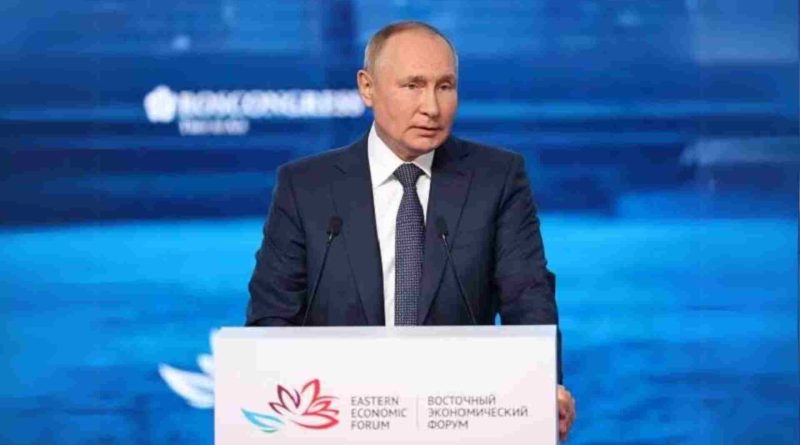Russia’s Decision on Natural Gas Supplies to Europe: Implications and Analysis
Putin had hinted at the possibility of Russia supplying additional gas to Europe at a time when millions of households face exorbitant winter energy bills.
A man is seen working at the Amur Gas Processing Plant in Russia. Spanning 800 hectares, it boasts an estimated annual capacity of 42 billion cubic meters of natural gas.
LONDON — Russia has opted against boosting its natural gas supplies to Europe, dashing hopes that Moscow might loosen its grip on the market shortly after President Vladimir Putin’s assurance of assistance.
The highly anticipated auction results on Monday revealed that Russia’s state gas giant Gazprom had not secured additional gas transit capacity for November, neither through the Ukrainian pipeline system nor via lines into Western Europe through Poland.
Gazprom only booked 30 million cubic meters per day on the Yamal-Europe route out of the 86.5 million cubic meters per day available for November, a quantity comparable to that booked in September, and has not secured any volumes via Ukraine.
These auction results are considered a crucial indicator to the market of upcoming volumes as they occur two to three weeks prior to the month in which natural gas flows.
Energy analysts suggest that these results indicate Russia’s lack of urgency in increasing supplies to the region, providing further evidence that the Kremlin is focused on ensuring a smooth launch of commercial flows via Nord Stream 2 — a contentious natural gas pipeline intended to transport Russian gas directly to Germany through the Baltic Sea.
This decision comes shortly after Putin hinted at the possibility of the country providing additional supply to Europe amidst the crisis of soaring winter energy bills for millions of households.
During an interview with CNBC’s Hadley Gamble at Russian Energy Week on Oct. 13, the Russian president also brushed aside allegations that the country was using gas as a geopolitical tool, labeling such claims as “politically motivated nonsense.”
The offer of more gas appears to be contingent on the completion of Nord Stream 2.
Russia is the largest gas supplier to Europe, accounting for approximately 43% of the European Union’s gas imports last year, according to data compiled by Eurostat.
However, Russia’s natural gas deliveries to Europe have been erratic since the end of September, exacerbating market concerns and leading to skyrocketing prices.
Contracts for November at the Dutch TTF hub — a European benchmark for natural gas — were trading at around 92 euros per megawatt hour on Tuesday morning. The front-month contract saw a decrease of around 2% for the day, retracting earlier gains, and has surged by nearly 400% since the beginning of the year.
EU lawmakers and the CEO of Ukraine’s state energy company Naftogaz have previously accused Gazprom of deliberately withholding additional gas volumes to Europe, exacerbating the region’s energy crisis.
In a rare public rebuke of Russia, the International Energy Agency also issued a statement in late September urging Moscow to send more gas to Europe to alleviate the region’s deepening supply shortage.
Russia claims it has fully met its contractual obligations to Europe.
In a separate development on Monday, the Swiss-based operator of Nord Stream 2 announced that it had filled the first line of the pipeline with so-called “technical” gas and was now prepared for commercial flows.
“This development increases the risk that Gazprom may not book as much capacity through auctions via Poland and Ukraine, as it may prioritize throughput on its new asset instead of paying for additional capacity,” said Tom Marzec-Manser, lead European gas analyst at ICIS, a commodity intelligence service.
Construction of Nord Stream 2 was completed last month, and Germany’s energy regulator has since stated that it has four months to complete certification of the project after receiving all necessary documentation for an operating license.
“With the European gas balance tightening as winter approaches, there is a high risk that Russian gas will not offer additional supply flexibility,” stated Kateryna Filippenko, principal analyst of European gas research at Wood Mackenzie, in a research note.
“The completion of gas-in procedures at Nord Stream 2, combined with no significant capacity bookings on other routes, seems to send a strong message to Europe — Gazprom might be willing to supply more gas, but it is conditional on Nord Stream 2 receiving approval.”
Critics of Nord Stream 2 argue that the pipeline is inconsistent with European climate objectives, increases the region’s reliance on Russian energy exports, and is likely to bolster Putin’s economic and political influence over the region.

